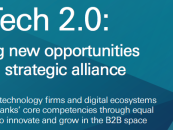
Fintech: Banks, Beware! Why Banks Have a Difficult Time Innovating
by Christian Hugo Hoffmann January 22, 2020The birth and rise of Fintech is deeply rooted in the global financial crisis of 2008, particularly the erosion of trust it generated. People’s anger at the banking system was the ideal breeding ground for genuine financial innovation.
In four simple words, fintech expresses “Power to the People”. Take money transfers, for example. By allowing transparency and cutting middlemen fees, fintech startups empower individuals to have control over their own money.
Such examples pose a number of obstacles which banks need to overcome to get fit and ready for the digital era. In the following, we portray some innovator’s dilemmas and problems, but also show that small and medium-sized banks that are at a disadvantage at first sight do not need to fall behind. Instead, on the contrary, they could easily become partners in great demand as well as key beneficiaries.
Why banks have a difficult time innovating
Even though it is a commonplace that banks are able to innovate – simply because they proved it, otherwise they would have been out of business long ago – subtle observations provide evidence that they face some severe complications on the way, at least in recent times. We would like to point to the following:
- At first glance, one would expect fintech leadership from established banks since they regularly spend substantial amounts on IT. Yet, a closer look reveals that investments in that area are not only growing modestly over time, but first and foremost the lion’s share is spent on the maintenance of existing legacy systems.
- In many cases, their business culture values tradition, consistency, reliability, predictability, and short-term profitability.

UBS Bank | image via Unsplash
- These values have served the banks very well in the past, as demonstrated by their self-conception which ranges between confidence and arrogance, but those values are ill-suited to a marketplace which is being radically transformed by digitization and which, therefore, requires the ability to respond quickly.
- Most activities which banks undertake take too long and cost too much. True innovation stems from experimentation, and it ought to be acceptable that the outcome of some experiments may be not to go ahead. Without the Popperian trial-and-error, it could mean that innovation efforts are remaining too conservative and not sufficient risks are being taken. Accounting for costs as well as duration are also fundamental needs, but if it then follows that most things are too slow and too expensive, then failure becomes unaffordable at the expense of innovation.
The best way to understand if customers wish for certain innovations is to equip them with a foretaste of what is to come. That is to create a prototype that, as far as possible, looks and feels like the end product to the customer. The non-customer-facing backend, though, can sometimes be implemented less rigorously. By embracing this procedure of prototype testing, of strengthening frontend tools and adopting a multi-channel approach, which goes hand in hand with short feedback cycles, banks can get a handle on a main game-changer, namely customer experience, which is set to influence the future development of the financial industry tremendously. If they happen to miss this chance, the elephant in the room is that incumbent banking systems become completely bypassed or that incumbents come to be perceived as utilities only.
The utilities risk
The proliferation of niche players specializing in certain services makes it more and more difficult for traditional financial institutions to keep ownership of their customers or the customer relationship. In other words, a major risk for incumbents is that they will do little more than supply the (basic) infrastructure for the provision of financial services while more agile, lean and customer-oriented fintech challengers or fintech startups that are not constrained by legacy IT systems take over banks’ front office, and thus will own the customer relationship.
Fintech for SMEs
In light of those risk factors, small and medium-sized enterprises (SMEs) in the banking landscape, the anchor point of the Swiss economy, are the key beneficiaries of disruptive startups. We see at least four reasons for that:
- SMEs’ pressure to catch up with the market leaders is very high; e.g., in Switzerland, UBS and CS set the standard for applying cutting-edge new technologies such as Artificial Intelligence (AI) and Machine Learning (ML) in banking.
- Their needs are less complex and, thus, more easily addressed by early stage-companies that do not have the resources to tackle complex problems for receiving first feedback from the market.
- SMEs rely on outsourcing expertise, not least because their talent pools are much shallower than those of large enterprises.
- They are willing to try novel tools which will have a tangible, substantial impact on their business.
This reasoning suggests a positive outlook for SMEs in an environment where, we would further argue, the importance of connecting established financial services players and young fintech firms via Application Programming Interfaces (APIs) stands out.

Figure 2: Three different Swiss examples that point to the future of (namely, open) banking. SGKB offers interfaces to make third-party services accessible to their customers without abandoning the customer relationship. Avaloq.one, behind one of the Swiss leaders in core banking software, operates a platform that encompasses a number of fintechs.And thirdly, Crypto Valley Zug constitutes a role model of a knowledge ecosystem around crypto and blockchain solutions.
Disrupted, reimagined.
You know what common sense says: if you can’t beat them, join them. The best move for financial institutions, be they small or large, is to collaborate, not to compete – and many banks, cultivating an open innovation mind-set, have understood this. In this context, different scenarios can be envisioned. In its report entitled “The Future of Fintech and Banking: Digitally disrupted or reimagined?”, Accenture details what it considers to be the most likely ones.
Scenario 1: banks continue to believe in the appeal and efficacy of their old business mantras and fail to adapt to the digital era, hence getting marginalized by new players.
Scenario 2: they appreciate the importance of customer experience, act accordingly, and embrace open innovation, mainly working together with new entrants, e.g. in the sense of establishing a connected API economy. The second option, especially in the wake of the upcoming supremacy of business ecosystems (over industry sectors and single corporations) or regulatory measures such as the PSD2 directive, appears far more likely, now that banks are laying their cards on the table, which, we hope, will result in many win-win situations.
Featured image credit: Unsplash





